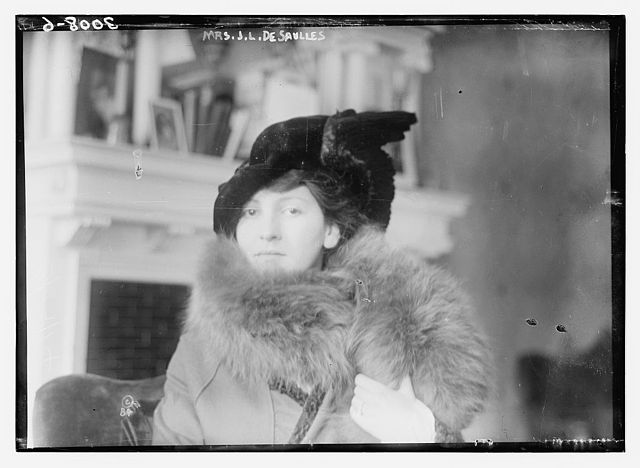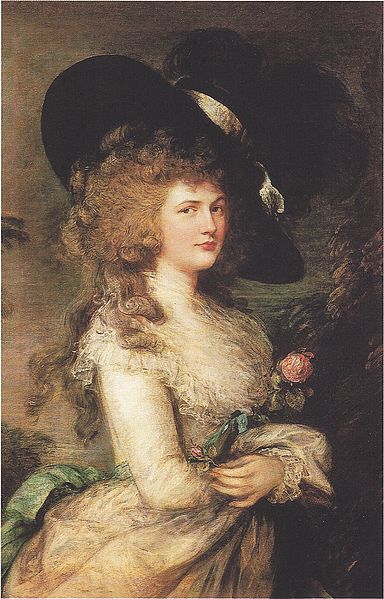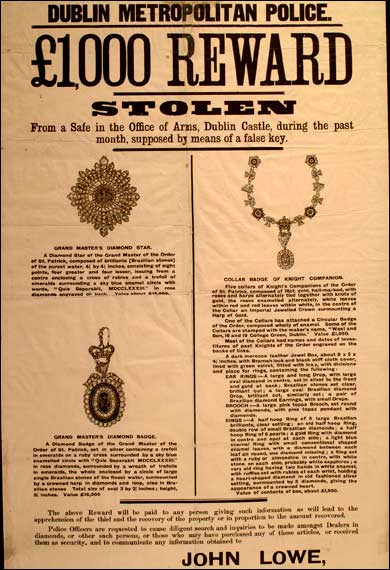
I stumbled across a mention of this murder while writing up Tuesday’s post on jazz and jazz musicians in interwar Britain, and had to do some digging! I turned up a plethora of New York Times articles–which, incidentally, made up the bulk of the Wikipedia pages for Blanca and John. The furor surrounding this murder case reminds of the trial of Madame Henriette Caillaux, which dominated newspapers right up to the declaration of war in 1914.
The 1906 murder of architect Stanford White by Harry Thaw was characterized as the Crime of the Century, but eleven years later, American society was gripped by yet another crime passionnel–the shooting of former Yale football star and playboy, John de Saulle, by his ex-wife Blanca (née Errázuriz). Blanca, a Chilean aristocrat and heiress, married de Saulles, who was sixteen years her senior, in 1911. Their marriage broke down after the birth of one child, a son named John de Saulles, Jr., and Blanca obtained her divorce with a testimony of her husband’s adultery from one Rodolfo Alfonzo Raffaele Pierre Philbert Gugliemi (the future Rudolph Valentino), a taxi dancer who obtained fame in New York circles for his sensuous tango moves.
The divorce was bitter, and the custody battle over their young son even bitterer. Blanca, furious over her ex-husband’s refusal to acknowledge their joint custody, took matters into her own hands in early August of 1917.
From the New York Times article (August 4, 1917):
Mrs. Blanca de Saulles shot and killed her former husband, John Longer de Saulles, ex-captain of Yale’s football team and society man, on the porch of his country home, “The Box,” in Meadow Brook Colony, near Westbury, Long Island, at 10 o’clock last night. About an hour later Constable Thorn found the woman, who is a Chilean heiress, 23 years old and famous for her beauty, hiding behind a hedge in the tear of the house. With her was her maid, Susanna Monteau. When he arrested her, Mrs. de Saulles exclaimed:
“I killed him and I am glad I did it. He refused to give me my child, although he was ordered by the court to do so on the first of July. He has refused again and again since then to let me have the boy.”
Mrs. de Saulles […] drove her own touring car from her home at Roslyn, Long Island, with her maid, walked up to the porch on which her husband was sitting, presented a revolver at his head and demanded that he should give up the child instantly. De Saulles either sought to parley with her or to disarm her, and a few seconds later she fired five shots at him….he was taken to the Nassau County Hospital, where he died at 10:20.
The murder trial of a wealthy and beautiful socialite was so sensational, it even pushed news of the war off the front pages. Blanca was represented by the formidable Henry Uterhart, who used the testimony of her personal maid of John de Saulles infidelities and abuse to excellent use. Blanca was acquitted of murder on December 1, 1917, after the jury deliberated for one hour and forty-three minutes, to much hurrah–though an op-ed in The Independent, titled “ARE WOMEN ABOVE THE LAW?” showed not all were pleased by the verdict:
It has come to this. The trial of a woman for murder or for almost any serious offense in the United States has become a disgraceful farce and a waste of public money. If the American people have no intention of holding women accountable before the law, why not say so and be done with it, and amend the statutes accordingly? Let it be understood that the only crime or sin that a woman can commit is to dress unmodishly or unbecomingly, and we shall know what to expect.
Still, we do not think it right to drop the matter at this point. There is an intellectual as well as a moral problem here which ought to be put into clear terms. The American people have fallen into wretchedly loose thinking on everything that concerns misconduct. We palliate it, we seek excuses for it, we explain it as proceeding from bad environment, intolerable provocation, misfortune, anything and everything except the one outstanding and dominating thing, namely, failure of self-control.
Failure of self-control it is, and this fact carries the problem back to our education and our mores. We teach smatterings of languages and of sciences, we pretend to teach vocations, we miserably fail to teach self-control. Neglect begins in the family, it is fostered by an anarchistic educational philosophy, it is defended as an inalienable right, or as a duty even, by all the revolutionaries who insist that the way to develop children into intellectual and moral prodigies and “democratic” citizens is to let them go on the loose. Discipline of any kind is tabooed as medieval and reactionary.
Boys and men are seriously harmed by this educational program, girls and women are in too many instances ruined by it. Happily, boys and men as a rule get enough hard knocks in the struggle for existence to acquire some things that formal education has omitted. The girls and women, who are finding their way into self-supporting activities, also acquire, as men do, habits of disciplined action and self-control. But for those who have little to do beyond amusing themselves and seeking their own gratification, the educational failure is fatal. They begin life as spoiled babies, they are told by everybody that they are sweet and altogether wonderful, they are indulged without restraint, they are permitted to get and to have their way by resorting to “tantrums,” they develop pronounced tendencies toward emotional ebullition and hysteria in adolescence, and by the time they are of marriageable age they are well equipt to make life hell for any man who is a big enough idiot to make love to them. The next chapter is soon written. If the husbands are patient hard-working “boobs,” faithful and uncomplaining, they learn to get their happiness out of their work and their companionships with men. If a husband is himself uncontrolled or dissolute, there is a story of unfaithfulness, the wife gets a gun, shoots up the offender, is put on trial for her life, calls in the insanity experts, gets newspaper headlines and portraits, and is triumphantly acquitted.
And the psychology that runs thru all this disgraceful business runs thru our attitude toward all women who seek to attain their ends by the “tantrum” method. This is the short and ugly, but strictly scientific description, for example, of the methods employed by the militant suffragettes, the White House picketers and the hunger-strikers.
It is because The Independent has fearlessly and consistently stood for the rights and opportunities of women, including the right of suffrage, that it feels called upon in the present crisis—for a crisis it is—to use these harsh words. Women must have every educational, industrial and professional opportunity. They must have the right to vote and to hold office. But with these rights they must accept responsibilities and acknowledge the imperative obligation of self-control. They must set their faces against the “tantrum” method and insist, with all good citizens of the other sex, that neither women nor men are above the law.
In the aftermath of her acquittal, Blanca escaped to San Francisco, and later Japan, with her son, then into a second marriage and divorce, and lived in relative obscurity until her death in 1940. And with her went this appalling scandal, which briefly distracted Americans from the war raging in Europe.





What a powerful story. “The divorce was bitter, and the custody battle over their young son even bitterer. Blanca, furious over her ex-husband’s refusal to acknowledge their joint custody, took matters into her own hands in early August of 1917”
Not the first time in human history that husbands have abused their wives, children and the court system, I bet. Worse still, John de Saulle seems to have been athletic, famous and well connected – he could flout the court’s ruling with impunity. Meanwhile the police did nothing, or actively protected John de Saulle.
The editorial of the Independent, therefore, was ludicrous.